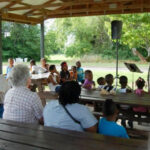Three in 10 Americans blame China or Chinese people for the novel coronavirus, according to a report released last week from the Center for Public Integrity and Ipsos.
They aren’t being quiet about it, either—one-third of respondents said they have “witnessed someone blaming Asian people for the coronavirus epidemic.”
In a few cases, that blame has become violent. In Texas, 19-year-old Jose Gomez stabbed three members of an Asian family—including a 2-year-old and a 6-year-old—because he “thought the family was Chinese, and infecting people with the coronavirus,” according to an FBI report. In New York City, four teenage girls accused a 51-year-old Asian woman of causing coronavirus and then attacked her on a city bus, hitting her hard enough with an umbrella that she needed stitches.
Now is the time for Christians to show gospel-powered love.
The bus incident joins 11 other coronavirus-inspired hate crimes against Asian Americans that New York City police have investigated. Nationwide, more than 75 anti-Asian assaults and harassments have been reported.
“This COVID situation seems to be bringing to the surface all the latent and subtle racism that has been hiding in our hearts,” said TGC president Julius Kim, who is Korean American. He’s aware that people are looking at him differently now. “I’ve never felt more Asian in my life than I did today at Costco.”
TGC founding Council member Stephen Um, also Korean American, calls it “the look.” He sometimes gets the suspicious side-eye himself, and he worries about his daughter, who heard unkind comments the last time she went out.
Kim says it feels like he’s back in kindergarten and one of the only Asians in a classroom full of white kids. “I’m trying to sense what is the right thing to say, the right thing to do so I don’t bring unnecessary attention to myself,” he said.
Periods of Racism
America’s historical racism against Asians is serious. During a bubonic plague outbreak in 1899, officials in Hawaii quarantined Asians and native Hawaiians in a “Chinatown” and then burned buildings where plague victims had died. (One fire got out of control and burned down one-fifth of Honolulu.) During World War II, nearly 120,000 Japanese were confined in internment camps. And during the SARS outbreak in 2003, some Asian Americans and Canadians were turned away from businesses, avoided on subways, and saw their hours cut at work.
Racism is ugly, and we cannot put a little iodine and a band-aid over it. We have to go deeper, to find out what is causing this cancer.
Racism related to coronavirus has been called out by op-eds in the Los Angeles Times, The Washington Post, and The New York Times. A few weeks ago, the Asian American Christian Collaborative released a statement calling for “an immediate end to the xenophobic rhetoric, hate crimes, and violence against our people and communities.” (Um signed it, Kim didn’t.)
Calling out the sin of racism is a good thing, Kim said. But often the ideas proposed—for Asian Americans to be part of the solution, for others to stand in solidarity and speak out against racism—while vital, don’t go far enough, he said.
“That’s not going to get to the core of the disease,” he said. “Racism is ugly, and we cannot put a little iodine and a band-aid over it. We have to go deeper, to find out what is causing this cancer.”
Curing the Cancer
Christians can only consistently and effectively stand against racism with the transformative work of the Spirit, Kim said. “Our chemotherapy and radiation is the gospel.”
Only the gospel provides both the proper motivation and also the primary place to start combating racism, he said.
Um says the difference between secular social justice and biblical justice is that “speaking truth and forgiveness and reconciliation are in the Bible but not in the cancel culture, which is far more brutal and unforgiving.”
Now is the time for Christians to show gospel-powered love, Kim said.
Christians can only consistently and effectively stand against racism with the transformative work of the Spirit.
“Perhaps the best way to encourage and support our Asian friends is to learn from biblical lament: listen to them without prejudice, letting them tell their stories without jumping to conclusions,” he said. “Listen to them with love. And then weep with those who weep.”
Friends also learn more about each other and the unique ways in which their stories have shaped their lives, Kim said. So if you’re interested in history, consider learning not only how Asian Americans have been wronged, but also the ways they’ve succeeded: Chinese immigrants largely built the transcontinental railroad, Korean immigrants started profitable businesses that contributed to the American economy, children of Japanese immigrants translated for the American army during World War II.
And if you’re in a position to lead, do so by modeling compassion and acknowledging the problems, Kim said. “If those in leadership positions don’t lead by leveraging their influence and authority, it’s very difficult for those in subdominant positions to engage the issues.”
“A lot of non-Asians are standing with us, and we feel loved and supported by them,” he said. “Even in the midst of these challenges—where there are no easy solutions—I can still dare to hope because Jesus Christ is King.”
Involved in Women’s Ministry? Add This to Your Discipleship Tool Kit.
 We need one another. Yet we don’t always know how to develop deep relationships to help us grow in the Christian life. Younger believers benefit from the guidance and wisdom of more mature saints as their faith deepens. But too often, potential mentors lack clarity and training on how to engage in discipling those they can influence.
We need one another. Yet we don’t always know how to develop deep relationships to help us grow in the Christian life. Younger believers benefit from the guidance and wisdom of more mature saints as their faith deepens. But too often, potential mentors lack clarity and training on how to engage in discipling those they can influence.
Whether you’re longing to find a spiritual mentor or hoping to serve as a guide for someone else, we have a FREE resource to encourage and equip you. In Growing Together: Taking Mentoring Beyond Small Talk and Prayer Requests, Melissa Kruger, TGC’s vice president of discipleship programming, offers encouraging lessons to guide conversations that promote spiritual growth in both the mentee and mentor.

































